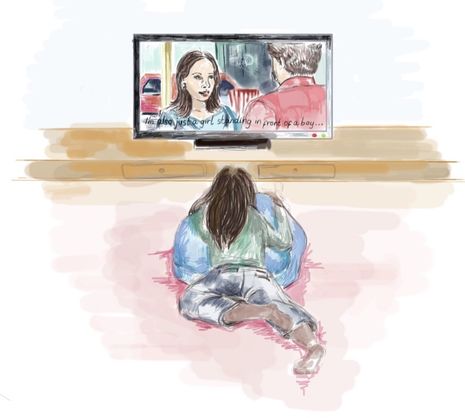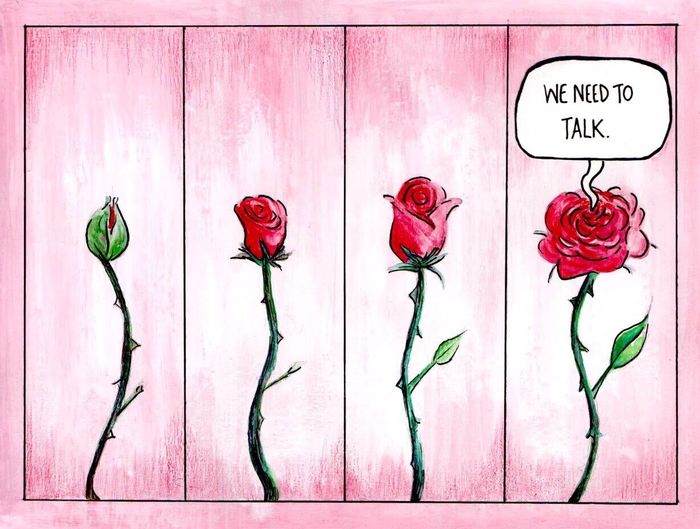I Have No Idea About Love, Actually
Deputy Features Editor Akshata Kapoor writes about the relevance of conventional western love stories to her Indian upbringing

“I’m just a girl, standing in front of a boy, asking him to love her” I say to my clueless friends, begging them to validate my last-ditch, desperate plan to win over my crush, fuelled by a recent watching of Notting Hill. I regularly quote a hundred different rom-coms and purely non-com cheesy romance movies to my friends, turning every sleepover into an opportunity to binge-watch The Notebook and Bridget Jones Diary, forcing my boyfriend to abandon his pointless action films for a good Sandra Bullock marathon on every date.
People are usually surprised when they discover my obsession with romantic films, and I’m surprised by their surprise and implicit distaste for the same. I soon learnt about the connection people made between being logical or remotely clever and pushing away romantic films as sappy nonsense. Yet, the exchange remains the same: Every time someone says “How can you possibly like this movie?”, I reply, “why not, it makes me feel happy and loved”, and then they reply with the most disgusted look on their face, “you do know that love never really works out that way in real life, don’t you?” and on one hand I want to reply, “yes, I obviously had that figured out” but, on the other, I want to say, “but, it does.”
“Concepts of love and romance were left undiscussed at home and in the classroom”
Love is not an openly discussed topic in Indian households, especially in conservative ones, and especially in front of children. Most adults and parents, at least those of whom I grew up around, rarely show signs of affection in family settings beyond a tender word or, at most, a hug. Any display of affection is looked down upon in public spaces and can get you suspended from school or college. The sights of couples kissing or cuddling that one takes for granted in Western countries are all but absent on the roads of Mumbai. It was sitcoms and rom-coms that introduced me to the idea of love. This may seem ridiculous to a reader from the UK, but the first time I saw two people kissing was definitely not at home or at the mall, but on the television screen.
I'm not sure what exactly is hushed up – sex, relationships, romance, or just all of them together. Of course, there have always been and are now still some great representations of love in Indian culture in Bollywood and the Indian film industry. Love is, as expected, romanticised in movies where actors sing to their lovers in the pouring rain or stand up against family restrictions to declare true love or do mad, hilarious things to get their crush to love them back.
But in the most intimate unit, my home, love was just never discussed. Mostly, it was derided as being worthless and of no concern to me. So dismissed was the idea of any kind of non-platonic relationship that I would be nervous to tell my parents about becoming friends with boys. I think at the root of it was some twisted logic that I did not need to be dependent on anyone else to get through school or college, and if I avoided blasphemous sexual relations with that attitude then all the better. Like most others, I got much of my sex education from the internet, and even more of my “love education” from it as well.
The spontaneous proposals and passionate summer flings I saw on my distant TV screen were more than the fiction that people now pedantically claim them to be when talking to me: they belonged to an entirely different world. Here in India, my teenage summer vacations consisted of awkwardly convincing my mom to let me buy a bikini and failing, not being courted by some miraculously good-looking, same-aged boy. The earlier years at school saw no Clueless/Mean Girl/Princess Diaries-style glow ups and foot-popping first kisses for me and my friends, but instead were filled with hushed up relationships and shameful hook-ups on shady staircases. More problematically, teachers often insinuated that girls who interacted with too many boys were of questionable character. The stigma around relationships created an atmosphere of awkwardness at the very least, and vicious stereotyping and gossiping at worst. On the most basic level, despite what Hugh Grant may say in Love, Actually, I rarely “got a sneaky feeling […] that love actually is all around.”
“As cheesy as it sounds, I just started seeing the possibility of love existing in many different forms”
But, as I kept watching rom-coms and reading cheesy novels, I realised that their reliance on conventional romantic narratives was not necessarily exclusionary. For every airport love declaration that may just get you arrested in India, there was a message about the inevitability of love that would not escape me. Every 500 Days of Summer love-at-first-sight elevator encounter that was prevented by the judgemental lift attendant in my building was made up for by the fact that I did think about a person whenever I heard a particular song. Concepts of love and romance were left undiscussed at home and in the classroom, giving me the space to form my own understanding of them. The impracticalities of being wholly influenced, in my situation, by Western rom-coms meant that I watched them much more for feel-good sensation and sappy messages rather than because I truly believed in replicating the success of most tropes.
And so, somewhere in between my fairly conservative upbringing and the love stories I read and watched, I don’t think I grew up confused or a non-believer. Instead, as cheesy as it sounds, I just started seeing the possibility of love existing in many different forms and degrees. Not every love can be pure and passionate, unending and unconditional. The love that surrounded me was rather quiet and shy. Undoubtedly, being able to openly discuss relationships and romance would have lead to a much more comfortable childhood, but in a way, I managed just fine without it.
My grandparents, relatives, and several many of my friends’ parents have had an arranged marriage, and yet, it never seemed to me as though the arrangement devalued their love significantly. Of course, I questioned several times how strange it would be to meet a stranger and be forced, on several levels, varying for different people, to spend the rest of your life with them. Unpleasant as it seems to me, it doesn’t delude me about the existence of love. If love could be formed at first sight, then it can be formed at the 100th too, out of routine and convenience. I have never seen my parents show much outward affection. I didn't think this was odd before I started watching shows. Perhaps they love each other, perhaps not so much (I have no idea, we really, really don’t talk about this stuff). But, 20 years later, they’re still the only ones who can deal with each other’s terrible jokes, loud snores, and unreasonably early sleep schedules.
On the bus ride to school at 7 am in the morning, my friends and I would pass by Marine Drive, a promenade where people go to exercise, meet other people, and just stare out at the Arabian Sea, escaping the bustling city behind them. My friends and I would keep ourselves awake by counting the couples that dotted the promenade. College-students taking a stroll before being late to class, older couples going on walks, and younger couples just sitting hand in hand, looking out at the waves. As the bus whooshed past a couple clinging onto each other in the perfect privacy of the endless road, I thought about the quote from About Time: “We’re all travelling through time together, every day of our lives.”
And when you put love in terms of a collective journey, I think, every exchange seems like a mini airport proposal. Love stories and rom-coms taught me the cheesy, utopian ideals of love, compromise, determination, and a little bit of pure luck. Strip away all the impractical external factors from these films and look closely enough: you can find this luck, love, compromise, and determination everywhere.
 News / Uni Scout and Guide Club affirms trans inclusion 12 December 2025
News / Uni Scout and Guide Club affirms trans inclusion 12 December 2025 News / Cambridge Vet School gets lifeline year to stay accredited28 November 2025
News / Cambridge Vet School gets lifeline year to stay accredited28 November 2025 Science / Did your ex trip on King’s Parade? The science behind the ‘ick’12 December 2025
Science / Did your ex trip on King’s Parade? The science behind the ‘ick’12 December 2025 News / Cambridge study finds students learn better with notes than AI13 December 2025
News / Cambridge study finds students learn better with notes than AI13 December 2025 News / Pembroke to convert listed office building into accom9 December 2025
News / Pembroke to convert listed office building into accom9 December 2025









